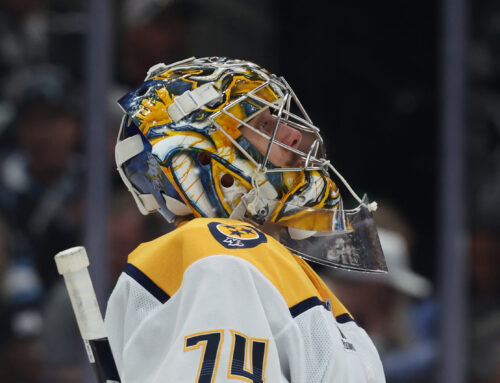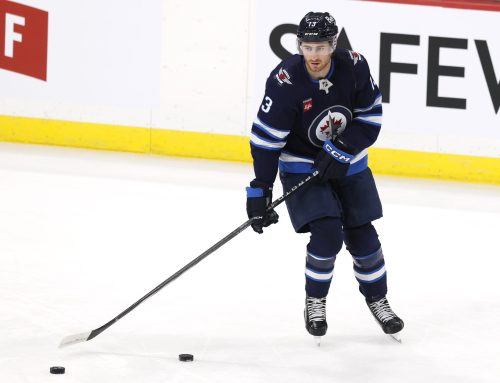I am writing about a few players who are bubble keepers of mine. Yours are probably for the most part different, although my analysis on these players could directly help you if you have a similar type of player. I'll discuss different types of bubble keepers that you may encounter, as well as the thought process that you can use in deciding which player(s) to keep. Every league is different, so one-size-fits-all advice doesn't apply to everyone.
Today will be a mix of forwards and goalies. To wrap up Bubble Keeper Week tomorrow, I'll discuss a few defensemen that are on my bubble keeper list. (Wrap… bubble… bubble wrap… get it? Okay, I'll stick to writing.)
Andrew Mangiapane (65% owned in Fantrax leagues)
Type of keeper: Smallish non-pedigreed overachiever
First-round picks often get claimed early in keeper league drafts. Sixth-round picks? Not so much. You probably didn't have Mangiapane on your radar until recently, even with back-to-back 100+ point seasons in the OHL and point-per-game production in his last two AHL seasons. For more on Mangiapane, purchase your copy of the Fantasy Guide, where Dobber has featured him as the Flames player in his Lowdown.
The 5-10, 184 lb. winger recorded almost all of his 2019-20 production at even-strength, as just one of his 32 points was on the power play. It will be interesting to see what he is capable of with more power-play time. However, it won't get any easier for Mangiapane to secure more power-play time (0:31 PPTOI in 2019-20), as the Flames have since added Dominik Simon and Josh Leivo, both of whom are capable of second-unit power-play minutes.
Expected to play on the Flames' second line with Matthew Tkachuk and Mikael Backlund, Mangiapane should be projected to reach the 40-point mark for the first time in his career. One sign that he has been trending upward is his second-half production, as he scored 17 points over his last 26 games. Over a full season, that would work out to over 50 points.
Jordan Greenway (56% owned in Fantrax leagues)
Type of keeper: Big-bodied young forward that needs time
If you're investing in a player early, you may want to check his size, as it may affect his development curve. That player may need additional time – sometimes up to 400 games – so he may not be the right fit if you need him to contribute much sooner than that. There are opportunity costs from carrying the player for multiple seasons when a more current asset can help your team, or if a newer, shinier prospect is on the way. One comparable here is Jake Virtanen, who was drafted in 2014 and may finally emerge as a 40+ point threat in 2020-21. Another writer has discussed Virtanen in more detail this week, and I've discussed him recently, so I'll leave him alone here.
Greenway is another example of this theory. Drafted one year after Virtanen (2015), the 6-6, 225 lb. winger has yet to reach the 30-point mark in two whole seasons in the NHL. His scoring and icetime increased modestly in 2019-20, and he even saw icetime with Kevin Fiala and the since-departed Eric Staal in the postseason. He was also helped by Jason Zucker being traded to Pittsburgh, scoring eight points in 14 games after the Zucker trade.
Wild GM Bill Guerin completed a tremendous roster overhaul this offseason, which could in the long term provide Greenway with more opportunity. On the downside, the Wild are finally able to bring in Kirill Kaprizov, which could keep Greenway further down the depth chart. So it's likely he will need to earn his opportunity. If you're waiting on Greenway, exercising patience is probably your best bet. He seems on track to make continued modest improvements, but it might be a while before any big breakout occurs.
Jeff Carter (36% owned in Fantrax leagues)
Type of keeper: Former must-own on back-9 of career
Carter is an example (at least for me) of what can happen when you hang onto a player for a year too long. He missed the majority of 2017-18 with a leg injury, but he still managed to produce at a 0.80 PTS/GP pace (22 points in 27 games) as he had his previous two seasons. I thought I could keep him for another two seasons after that, but alas, it didn't work.
Since that 2017-18 season, Carter hasn't been the same player. In 2018-19, he posted just 33 points in 76 games, then just 27 points in 60 games in 60 games. That's a new normal of about 0.45 PTS/GP for Carter. Worse yet, his plus-minus has been around minus-20 for the past two seasons, which stems from playing for a rebuilding team.
Both Carter's shot total and shooting percentage have also declined over the past two seasons, which are signs of an aging (now-35-year-old) player. Carter consistently shot at over 10% for most of his career with well over 200 shots, but now he is projecting to shoot below 10% and less than 200 shots. Carter missed the last 10 games with a core muscle injury, so it's possible that wear and tear is also catching up.
Carter has almost no keeper value at this point. However, if the lower shooting percentage is due to poor puck luck instead of age, it's possible that he could be a serviceable waiver-wire add during the season. With many of the Kings' long list of young prospects still potentially at least a year or two away, Carter should continue to receive the equivalent of middle-6 and second-unit power-play minutes. When Carter's contract finishes after the 2021-22 season, the Kings will probably be ready to move on.
Antti Raanta (70% owned in Fantrax leagues)
Type of keeper: Certified Band-Aid Boy with upside
I have almost no doubt that Raanta would be a starter in this league if not for the injuries. I've mentioned this numerous times in the past, but in case you missed it, I'll summarize. Since the 2014-15 season, Raanta has the best save percentage (.924 SV%) and the second-best goals-against average (2.35 GAA) among goalies that have played at least 100 games. Mind you, that is over 161 games, where other top starters during that span (eg. Andrei Vasilevskiy, Tuukka Rask, Ben Bishop) have all played at least 250 games.
That time dates back to 2014-15, when Raanta was a backup to Corey Crawford on the Blackhawks. Remember that he also backed up Henrik Lundqvist on the Rangers before his time with the Coyotes. Between his role as a backup and injuries, Raanta has never played 50 games in a single season. So he isn't someone you should count on for a high volume of starts. Now that Darcy Kuemper has established himself as the starter in Arizona, that shouldn't change as Raanta enters the final year of his contract.
If the Coyotes are to have any level of success in the 2020-21 season, they will need to double down on the defensive approach they have used for years. One of their major scoring additions last season (Phil Kessel) hasn't panned out without an elite center, while the other (Taylor Hall) left via free agency. Plain and simple, they're simply not going to outscore teams, so they're going to have to out-defend them. Raanta may be lower than a 50/50 bet in earning a win when he starts, but he shouldn't damage your other goaltending stats.
Jack Campbell (52% owned in Fantrax leagues)
Type of keeper: Potential handcuff backup goalie
Are backup goalies worth handcuffing at the start of your season? It really depends on your roster space and replacement options should your starter go down. Nevertheless, that handcuff backup could be valuable at a moment's notice, particularly when you get that sinking feeling of watching your goalie skate off the ice with what looks like an injury that will cost games played.
As for retaining Campbell as Frederik Andersen insurance, he still has the inside track on the backup job in spite of the Leafs signing Aaron Dell in the offseason. In six games as a Leaf, Campbell posted four quality starts to go with a 2.63 GAA and .915 SV%, which are reasonable numbers for a backup. Prior to that, Campbell had a very strong 2018-19 season with the Kings as Jonathan Quick's backup, posting a 2.30 GAA and .928 SV%.
With the signings of longtime Sharks backup Dell and onetime Leaf Michael Hutchinson, the Leafs have discovered the importance of having organizational goaltending depth. Signing these goalies seems to signal a plan of not burning out Frederik Andersen before the playoffs, given their lack of postseason success. There might be an opportunity for more starts for goalies not named Andersen, who in 2019-20 didn't reach 60 games for the first time over the past four seasons. (Because of the shortened season, no goalie played in 60 games, but at 52 games Andersen still finished within the top 5 in games played.)
Now that the Leafs have signed another viable backup in Dell, Campbell's spot on the roster might not be as secure. He's probably better off on your waiver wire, although he'll be a hot commodity should workhorse Andersen suffer an injury in what is an important season for the Leafs to get over the hump.
*
Switching gears, I recently appeared on the Steve Laidlaw Podcast to discuss the offseason in Vancouver.
To summarize, the Canucks' offseason might not have been as terrible as it seemed, although it certainly could have been a lot better. I even discuss the Flames a little bit in the podcast, since a few Canucks from last season will be calling Calgary home. With the possibility of an all-Canadian division (at least to start the season) seeming likelier, the Vancouver-Calgary rivalry could emerge as one of the strongest in the league. I'm really excited for an all-Canadian division, even if it only lasts part of the season and we never see it again after that.
*
For more fantasy hockey discussion, or to reach out to me, you can follow me on Twitter @Ian_Gooding.





 FLA
FLA CHI
CHI NYR
NYR PIT
PIT L.A
L.A COL
COL BUF
BUF UTA
UTA PHI
PHI STL
STL VAN
VAN CBJ
CBJ S.J
S.J OTT
OTT
